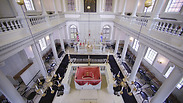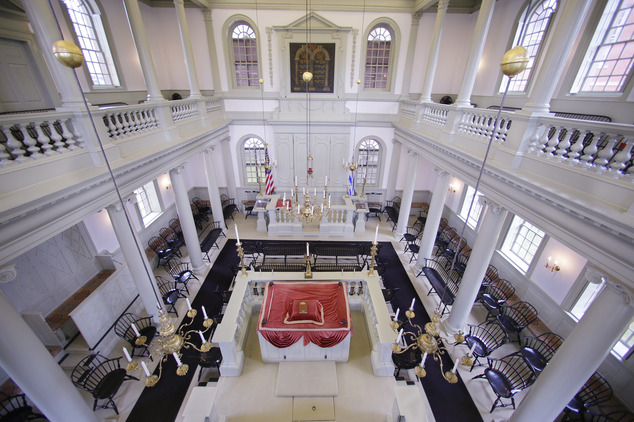
Touro Synagogue
Associated Press
US judge: Congregants can take control of oldest US synagogue
A New York congregation and a Rhode Island congregation battle for property rights of a Rhode Island synagogue and ceremonial bells; Judge rules in favor of Rhode Island congregation in 106-page ruling.
The congregation that worships at the nation's oldest synagogue prevailed Monday in a bitter legal fight that threatened its existence, as a federal judge ruled it may now control its own destiny and decide what to do with a set of ceremonial bells worth millions.
The lawsuit pitted congregants at the 250-year-old Touro Synagogue in Newport, Rhode Island, against the nation's oldest Jewish congregation, Shearith Israel in New York City.
U.S. District Judge Jack McConnell on Monday awarded Congregation Jeshuat Israel, of Newport, control of Touro, rejecting arguments from Congregation Shearith Israel that it is the synagogue's rightful owner.
McConnell also ruled the Newport congregation is the owner of a pair of ceremonial bells, called rimonim, and may do what it chooses with them. The bells are valued at $7.4 million.
Lawyers for the Newport congregation called the decision a victory for religious liberty. One member, Gary Naftalis, said it would ensure the survival of the nation's oldest synagogue as a place of worship.
"The effort to evict the Rhode Island congregation has been thwarted, and an important piece of American history and of Jewish history has been preserved," he said.
Deming Sherman, a lawyer for the New York congregation, said it was too early to say whether they would appeal.
"We're obviously disappointed at some of the findings by the court. But I don't have any more to say until after I've reviewed the decision," he said.
McConnell's 106-page decision reads at times like a history book and relies on documents that go back to Colonial times. It recounts the early history of Jews in America and traces the origins of the Jews who populated Newport beginning in 1658.
The judge, who held a nine-day trial last year, said the guiding light behind his decision was the intention of the community that established the synagogue in 1763.
"The central issue here is the legacy of some of the earliest Jewish settlers in North America, who desired to make Newport a permanent haven for public Jewish worship," he wrote.
The synagogue is a national historic site and tens of thousands of visitors from all over the world pass through its doors every year.
In 1790, George Washington visited Touro and then sent congregants a letter saying the government of the United States "gives to bigotry no sanction, to persecution no assistance." It is considered an important pledge of the new nation's commitment to religious liberty.
During and after the Revolutionary War, most of the city's Jewish residents left, and many moved to New York. By the 1820s, no Jews were left in Newport, and Congregation Shearith Israel became Touro's trustee.
Decades later, Jews returned and Shearith Israel sent items back, including two pairs of rimonim, which adorn a Torah scroll and were made by Colonial silversmith Myer Myers.
Over the years, the two congregations occasionally struggled for control of the synagogue, but by the 2000s, the New York congregation was mostly not involved in Touro's affairs, although it was still the synagogue's trustee.
In 2012, the congregation at Touro was struggling to pay its bills and was unable to raise the money for an endowment. Its leaders, worried about Touro's future, formulated a plan to sell one set of the bells to the Museum of Fine Arts in Boston for $7.4 million and use the money to fund an endowment.
The New York congregation objected, saying the sale violated its religious beliefs. It said the congregation at Touro was required to adhere to those beliefs. It also asserted that it owned the bells, and said it wanted to evict the Newport congregation.
McConnell rejected its arguments on all counts. He also removed the New York congregation as trustee, saying its attempt to evict the Newport congregation had made it unfit to serve in the role.
Instead, he appointed the Newport congregation as trustee of the building. The judge said it had maintained the structure and grounds and had ensured it was open for public worship, which he found was the purpose of the trust that owns it.
It is unclear what will happen next with the bells. The Museum of Fine Arts withdrew the offer to buy them after the dispute began, although they remain on display there, on loan from Touro.











